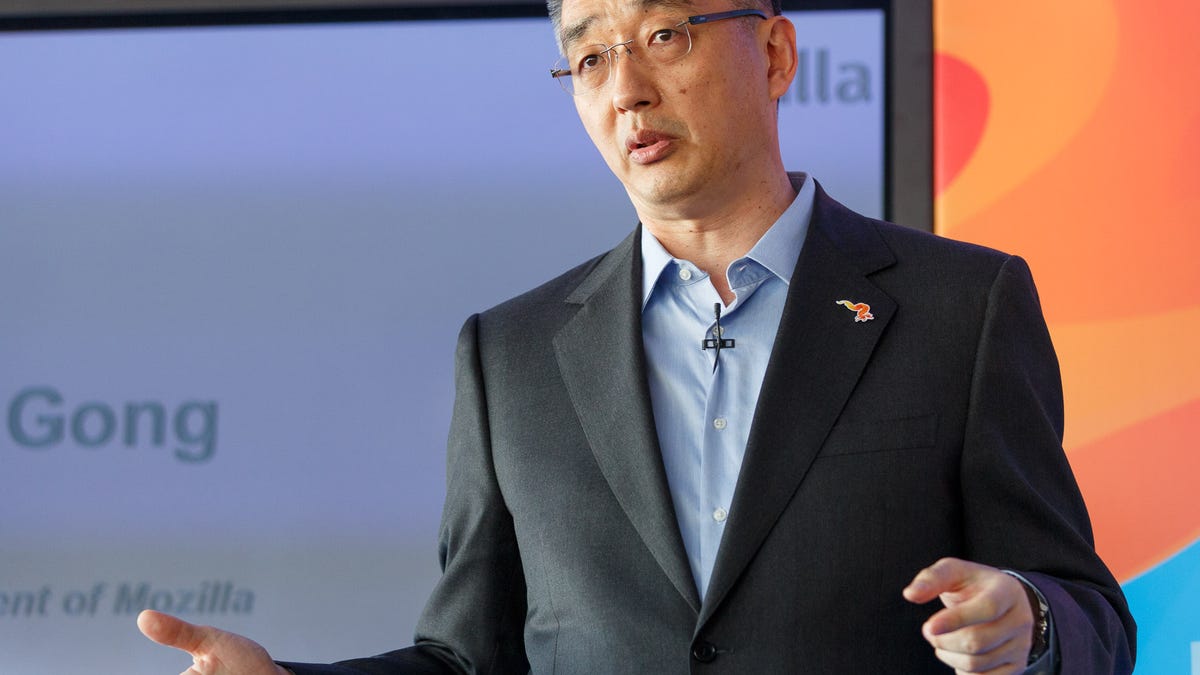Startup picks up the torch for troubled Firefox OS
Firefox maker Mozilla aimed to upstage Apple and Android on mobile phones, but scrapped its alliances with Verizon and other carriers. That's where a new contender comes into the picture.
A Hong Kong-based startup aims to pick up where the creator of the Firefox OS left off.
Nonprofit software maker Mozilla, best known for its Firefox browser, said earlier this week that it had dropped its efforts to team up with carriers for a smartphone operating system designed to challenge the dominance of Apple's iOS and Google's Android.
Firefox OS was designed to use Web technology to loosen the grip that Android and Apple have over your smartphone experiences, but that's no easy venture. For consumers, it can be daunting to switch from one environment to another, what with having to pay again for the same apps, move to different online services and risk the possibility that content such as video or e-books won't be available.
Mozilla had hoped to smooth things out through key partnerships to push its software. The Mountain View, California, organization allied with a sizable number of carriers around the world such as Telefonica, Orange, Telenor, Deutsche Telekom, China Unicom and most recently Verizon. Now that mission is being taken over by Hong Kong-based startup Acadine Technologies, run by the former president of Mozilla. Its alternative is H5OS, which is based on Firefox OS but which will diverge and possibly become very different.
"We are definitely working with a good number of partners who desire a non-Android OS to power their mobile devices," Acadine founder and Chief Executive Li Gong told CNET. He declined to detail discussions but said, "We are now the frontrunner in terms of choice in this space."
The shift underscores how hard it is to take on Google's mobile might. In the second quarter, Android powered 83 percent of smartphones sold, according to analyst firm International Data Corp. Apple's iOS software, which powers the company's iPhones and iPads, is also widely used, but is more popular in higher-end markets where Mozilla initially didn't aim Firefox OS.
Mozilla's Firefox OS is just the latest in a long list of mobile operating systems that have struggled to get the attention of consumers, who have typically shied away from upstarts often characterized by a weak selection of apps available. That hard-luck list includes Microsoft's Windows Phone, Samsung's Tizen, Jolla's Sailfish OS, Canonical's Ubuntu, Hewlett-Packard's WebOS and BlackBerry's BlackBerry OS.
The carriers, whose strong retail presence carries sway when consumers decide they need a phone, were an important ally for Mozilla. Some were unhappy that it scrapped the Firefox OS partnerships, according to people familiar with the alliances. Verizon in particular was displeased: The largest US carrier was counting on Firefox OS to power low-end flip phones that would work on its modern 4G LTE networks, so that it could retire out-of-date models that only worked on 3G networks. For all the popularity of Android and iOS smartphones with their big touchscreens, some customers aren't comfortable with the new style.
Verizon didn't respond to a request for comment.
What next for Firefox OS
Mozilla isn't pulling the plug on Firefox OS completely, but the carrier partnership plan is over, said Ari Jaaksi, senior vice president of connected devices.
"Because we were not able to deliver the best user experience possible, we decided to stop offering Firefox OS smartphones through carrier channels," he said in a statement. "We are working with our partners in the smartphone space to minimize any impact and fulfill our commitments."
Firefox OS is open-source software, meaning that anybody can see the underlying programming code and modify it for their own purposes. That's exactly what Acadine is doing with its H5OS. It's developing the software with $100 million in funding from Hong Kong-based Tsinghua Unigroup International, a subsidiary ultimately controlled by the Chinese government and the prestigious Tsinghua University in Beijing.
Acadine is seeking a second funding round from investors elsewhere in the globe, including venture capitalists and companies making a strategic investment, Gong said. "The major reason to raise now instead of a couple of years from now is that we want to dispel very early the incorrect perception that we are somehow a China-backed company. We are really a pure Silicon Valley-style startup," he said. "We carefully chose to incorporate in Hong Kong instead of the US, or mainland China for that matter, because we foresee geopolitical factors that may impact our global business down the line."
Acadine has also hired engineers from Mozilla's ranks and counts as an adviser Andreas Gal, Mozilla's former chief technology officer and a founder of the Firefox OS project. It has more than 120 full-time employees, Gong said, including Mark Fulks, who leads Acadine's lab in Palo Alto, California, the heart of Silicon Valley.
Mozilla still hopes Firefox OS will power devices like this year's Panasonic 4K TV with apps and interactive features. And it's been working to encourage enthusiasts to install Firefox OS on their own phones.
It also hopes to preserve some influence among users of mobile devices in other ways, too. This week, Mozilla launched an app called Focus for Apple iPhone and iPad that can block user-tracking technology from advertisers, social media sites and analytics firms when people are using Apple's Safari Web browser.
"We want to build an Internet that respects users, puts them in control, and creates and maintains trust," said Denelle Dixon-Thayer, Mozilla's chief legal and business officer. "Too many users have lost trust and lack meaningful controls over their digital lives."


